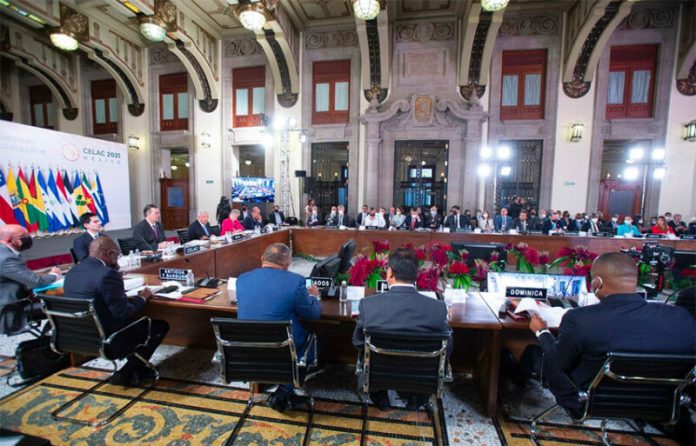President López Obrador called Saturday for Latin American and Caribbean leaders to aspire to the establishment of a European Union-style bloc, but the summit at which he made the call will likely be best remembered for division rather than unity.
The presidents of Paraguay and Uruguay made it clear at the Community of Latin American and Caribbean States (CELAC) meeting in Mexico City that they wanted nothing to do with the Venezuelan government, while the latter also took aim at Cuba and Nicaragua.
“In no sense or circumstance does my presence at this summit represent recognition of the government of Mr. Nicolás Maduro,” said conservative Paraguayan President Mario Abdo Benítez.
Maduro, who jetted into Mexico City on Friday night to make a surprise appearance at CELAC’s sixth summit, promptly interjected to say his administration didn’t recognize Abdo’s government either.
Minutes later, Uruguayan President Luis Lacalle Pou said his attendance didn’t mean his government was willing to be “accommodating” to those of Venezuela, Cuba and Nicaragua, all of which are widely considered to be undemocratic regimes.
“… We are worried and look gravely at what’s happening in Cuba, Nicaragua and Venezuela,” he said after asserting that they lack “full democracy,” don’t respect the separation of powers, use a repressive state apparatus to silence and jail protesters and don’t respect human rights.
Responding at greater length to Abdo, Maduro challenged the Paraguayan to set a place, a date and a time “for a debate about democracy in Paraguay, in Venezuela and in Latin America.”
He also defended the Cuban and Nicaraguan regimes, led respectively by Miguel Díaz-Canel, who spent several days in Mexico last week, and Daniel Ortega, who didn’t attend the CELAC summit.
“We must turn the page on the divisiveness that was inserted in Latin America, on the harassment of the Bolivarian revolution [that initiated by former Venezuelan president Hugo Chávez] and now the incessant harassment of the Cuban revolution and Nicaraguan revolution,” Maduro said.
For his part, Díaz-Canel charged that Lacalle was ignorant of the reality the people of Cuba face, noting their “courage” in the face of six decades of aggression from the United States, including the imposition of a trade embargo.
He also opined that the Uruguayan president should concern himself with internal issues rather than criticizing Cuba.

“Listen to your people, who collected more than 700,000 signatures against the law that you imposed and which changed the conditions to adjust fuel prices; … [it’s a] neoliberal package,” said the first secretary of the Communist Party of Cuba.
In contrast to Cuba, members of the opposition can sign petitions and complain in Uruguay because it’s a democratic country, retorted Lacalle. “That’s the great difference with the Cuban regime,” the center-right president said.
Speaking more tactfully, López Obrador said that Latin American and Caribbean nations should seek the creation of a bloc similar to the EU.
“In these times, CELAC can become the principal instrument to consolidate relations between our Latin American and Caribbean nations,” he said during the summit’s opening ceremony.
“We should build in the American continent something similar to what was the economic community that was the beginning of the current European Union,” López Obrador said while emphasizing the importance of each country maintaining their sovereignty.
His proposition is designed to make CELAC, rather than the United States-headquartered Organization of American States (OAS), the dominant multilateral organization in the Western Hemisphere.
López Obrador said that a CELAC bloc could provide a boost to the region’s economies – which are plagued by inequalities – and help member countries respond to health and other crises.
Weakening the OAS, which excludes Cuba and is not entirely trusted by the region’s leftist regimes, was a stated aim of Mexico at the CELAC summit, held at the National Palace.
Mexican Foreign Minister Marcelo Ebrard said last month that Mexico wants to say goodbye to the OAS, which was established in the middle of the last century, and replace it with a more modern organization.
“What’s Mexico’s proposal? Adiós to the OAS in its interventionist, meddling and hegemonic sense and the arrival of another organization we build in accordance with the United States for the 21st century,” he said.
Insinuating that it takes orders from the United States, López Obrador said in July that the OAS should be replaced “by a body that is truly autonomous” and “not anybody’s lackey.”
“It’s a complex issue that requires a new political and economic vision. … [It’s] a large task for good diplomats and politicians, like those who fortunately exist in all the countries of the continent,” he said at an event in Mexico City on July 24 to commemorate the 238th anniversary of the birth of Simón Bolivár, a military and political leader known as the “liberator of America” and a proponent of a unified Latin America.
“What I’ve suggested here might seem to be a utopia but it must be considered that without ideals on the horizon you don’t get anywhere. Let’s keep the dream of Bolívar alive,” López Obrador said.
Despite the differences of opinions among leaders, Ebrard characterized Saturday’s summit – the organization’s first high-level meeting since 2017 – as a success, noting that a range of resolutions were unanimously supported, including ones that condemned the United States’ blockade of Cuba and sought to create a cooperative COVID-19 vaccination program and a regional fund for disaster response.
“Nobody should be afraid of us having differences,” the foreign minister said, adding that they would only be a problem if they stopped the CELAC member countries from coming together.
“Despite the differences, … which are serious and important, the meeting was held and several substantive decisions were adopted,” Ebrard said.
Pursuing López Obrador’s vision of a European-style trading bloc that would replace the Organization of American States was not among them.
